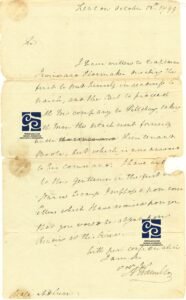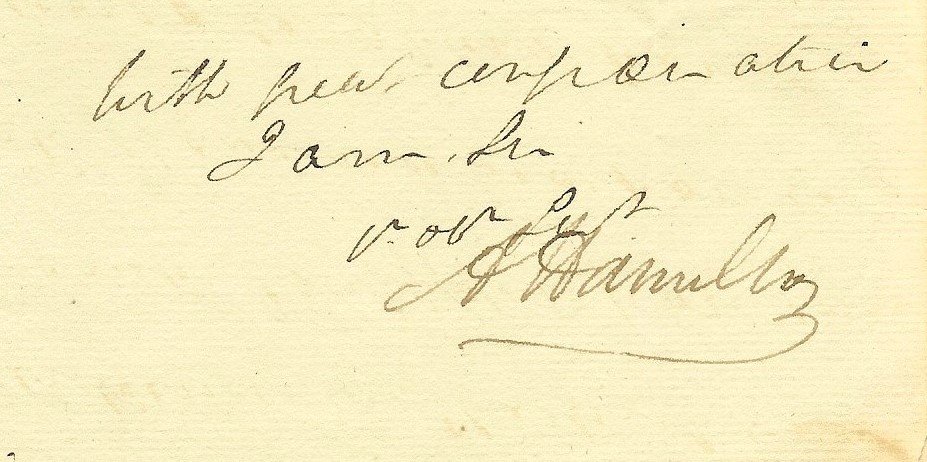ALEXANDER HAMILTON ORDERS MAJOR ADLUM TO MAKE PREPARATIONS TO MARCH HIS TROOPS IN PUTTING DOWN FRIES REBELLION
HAMILTON, ALEXANDER (1755-1804). U.S. Secretary of the Treasury, Founding Father, political philosopher and economist. Fine Manuscript Letter Signed, “A. Hamilton”. Full page, legal folio. Trenton, New Jersey, October 12, 1799. To Major John Adlum, at: Reading Pennsylvania, but redirected to Harve de Grace, Maryland. Docketed with a circular “October 12, Tren NJ” postal cancellation on the address leaf on verso. Adlum was a native of Pennsylvania. He was a soldier and then a major in the American Provisional Army during the American Revolutionary War. He would later be promoted to Brigadier General in the Pennsylvania militia. His surveying experience was sufficient for him to work in many state surveys, and he was soon appointed to study navigation of the Susquehanna and Schuylkill rivers. However his lifelong dream and greatest service was to the cultivation and science of American grapes, and the production of American wines, which he did in consultation with Thomas Jefferson, at Monticello. Hamilton writes:
“Sir:
I have written to Captains Irvine and Shoemaker directing the first to put himself in readiness to march, and the last to proceed with his company to Pittsburg taking with him the detachment formerly under Lieut Boote but which is now annexed to his command. I have written to these Gentlemen in the first instance because I supposed, from some letter which I have received from you that you would be absent from Reading at this time….I am sir, your obdt A. Hamilton”.
Fries Rebellion was the third and last tax related rebellion of the 18th century in the United States. The other two were being Shays’ Rebellion (central and western Massachusetts, 1786–87) and the Whiskey Rebellion (western Pennsylvania, 1794). When the Quasi-War with France threatened to escalate in 1798, Congress added to the army and enlarged the navy. To pay for it, Congress in July 1798 imposed $2 million in new taxes on real estate and slaves, apportioned among the states according to the requirements of the Constitution. It was the first (and only) such federal tax. As there were very few slaves in Pennsylvania, the tax was accordingly assessed upon dwelling-houses and land, the value of the houses being determined by the number and size of the windows. As the assessors road around and counted windows, their actions aroused strong opposition, and many refused to pay, making the constitutional argument that this tax was not being levied in proportion to population. Pennsylvania auctioneer John Fries organized meetings and advocated resistance in response to the tax. At a meeting called by government representatives in an attempt to explain the tax in a way as to defuse tensions, protesters waving liberty flags, some armed and in Continental Army uniforms, shouted them down and turned the meeting into a protest rally. In response to this action, President John Adams called out a force of federal troops and local militia. They marched into the rebellious counties and began making wholesale arrests of the insurgents. John Fries was among the men captured. Thirty men in total went on trial in Federal court. Fries and two others were tried for treason and, with the Federalists stirring up a political frenzy, were sentenced to be hanged. President John Adams, then pardoned Fries and the others convicted of treason citing: “a narrower constitutional definition of treason”. Adams then further issued a general pardon to anyone involved in the uprising in May of 1800, thus ending the tax revolt.
$19,500.00

